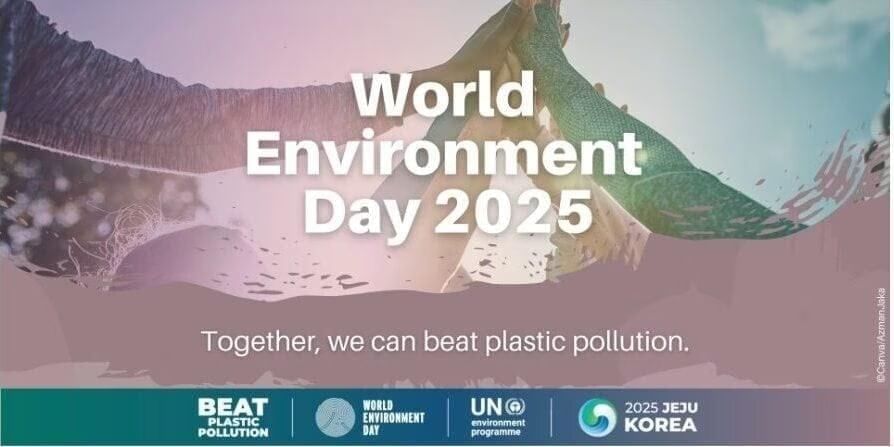CUET Commerce Exam > CUET Commerce Notes > General Test Preparation for CUET UG > Environment and Ecology: June 2025 Current Affairs
Environment and Ecology: June 2025 Current Affairs | General Test Preparation for CUET UG - CUET Commerce PDF Download
World Environment Day 2025

Why in News?
The year 2025 marks the celebration of World Environment Day, which will be hosted by the Republic of Korea. This year's focus is on addressing the critical issue of plastic pollution, raising awareness and encouraging proactive measures to combat this global challenge.
Key Takeaways
- World Environment Day is celebrated annually on June 5 in over 150 countries.
- It is organized by the United Nations Environment Programme (UNEP), dedicated to promoting awareness regarding environmental issues.
- The inaugural event took place in 1973 with the theme “Only One Earth”.
Additional Details
- Historical Background: World Environment Day was established in 1972 during the United Nations Conference on the Human Environment in Stockholm, which led to the official designation of June 5 as the day of observance.
- Theme for 2025: The emphasis this year is on “Beat Plastic Pollution”, aiming to raise global awareness on the urgent need to reduce plastic waste.
- Future Hosting: The Republic of Azerbaijan is set to host World Environment Day in 2026.
World Environment Day serves as a vital platform for global environmental advocacy, encouraging individuals and organizations to take action towards sustainable practices and environmental stewardship.
Kerala's Request to Amend Wildlife Protection Laws
Context. The Kerala government has asked the Union Ministry of Environment, Forests, and Climate Change to modify the Wildlife (Protection) Act of 1972. This change would allow the state to cull wild animals that enter human habitats.
Kerala's Requests to the Union Government.
- Amend the WLPA, 1972. To permit the culling of "man-eating" or dangerous wild animals without long procedural delays.
- Declare Wild Boars as Vermin. Under Section 62 of the Act, allowing their hunting in specific areas for a limited time.
- Remove Bonnet Macaques from Schedule I. This would enable wildlife authorities to capture and relocate these animals more easily.
Reasons for Increased Human-Wildlife Conflict
- Degraded Habitats. Deforestation, development projects, and agricultural expansion have reduced and fragmented the habitats available for wildlife.
- Rise in Certain Animal Populations. There has been a significant increase in the populations of wild pigs and monkeys, particularly bonnet macaques, exacerbating the conflict with humans.
- Human Activities. Activities such as grazing cattle in forested areas and changes in cropping patterns are drawing wild animals closer to human settlements.
- Ecological Imbalances. The decline of top predator species, due to historical hunting practices, has led to an unnatural rise in herbivore populations, contributing to the conflict.
Overview of the Wildlife (Protection) Act, 1972
- The Wildlife (Protection) Act, 1972 aims to protect wildlife and their habitats in India.
- It consists of six schedules that provide varying levels of protection to different species.
- Schedule I and II. These schedules offer the highest level of protection to species such as tigers and elephants. Offences against these species attract severe penalties.
- Schedule V. This schedule lists species considered as 'vermin', such as common crows and rats, which can be hunted without restrictions.
Procedure to Declare Vermin
- State Government's Request. A state government can petition the Central Government to classify a wild animal as vermin if it is causing significant problems like property damage, crop destruction, or posing threats to human life or livestock.
- Central Government Notification. The Central Government has the authority to declare a wild animal as vermin through a notification, specifying the area and time period for the declaration. This applies to animals not listed in Schedule I or Part II of Schedule II.
- Loss of Protection. Once an animal is declared vermin, it loses its protection under the Wildlife Protection Act. This allows for its hunting or culling without legal penalties.
Concerns Regarding Culling and Vermin Declaration
- Ecological Disruption. Large-scale culling can disrupt the food chain and disturb the balance between predators and prey.
- Risk to Non-target Species. Traps set for wild boars have inadvertently captured protected species like tigers and leopards in states such as Karnataka.
- Lack of Data. Many decisions regarding culling and vermin declarations are made without thorough data on species populations, crop damage, or conflict areas.
- Ethical Concerns.
- Sanctity of Animal Life. Mass or unjustified culling raises moral issues regarding the right to life of wild animals.
- Species Discrimination. Labeling certain animals as vermin can lead to their extermination based on human convenience rather than ecological need.
- Welfare Violations. Lethal traps and inhumane killing methods often inflict unnecessary pain on both target and non-target species.
The document Environment and Ecology: June 2025 Current Affairs | General Test Preparation for CUET UG - CUET Commerce is a part of the CUET Commerce Course General Test Preparation for CUET UG.
All you need of CUET Commerce at this link: CUET Commerce
|
164 videos|800 docs|1156 tests
|
FAQs on Environment and Ecology: June 2025 Current Affairs - General Test Preparation for CUET UG - CUET Commerce
| 1. What is World Environment Day and why is it significant? |  |
Ans. World Environment Day is an annual event celebrated on June 5th to raise awareness about environmental issues and encourage global action for the protection of the environment. Established by the United Nations in 1972, it serves as a platform for people to engage in activities that promote sustainability and environmental conservation.
| 2. What are the current wildlife protection laws in India, and why might they need amendment? |  |
Ans. The Wildlife Protection Act of 1972 is the primary legislation governing the protection of wild animals and plants in India. It prohibits hunting and trade of endangered species and establishes protected areas. Amendments may be considered to enhance conservation efforts, address human-wildlife conflict, and adapt to changing ecological challenges, especially in regions like Kerala where biodiversity is rich yet threatened.
| 3. How does Kerala's biodiversity contribute to its economy and environment? |  |
Ans. Kerala is known for its rich biodiversity, including unique flora and fauna, which supports various sectors such as tourism, agriculture, and traditional medicine. This biodiversity not only enhances ecosystem services like pollination and water filtration but also attracts tourists, boosting the local economy and promoting conservation efforts.
| 4. What role do local communities play in wildlife conservation in Kerala? |  |
Ans. Local communities are crucial in wildlife conservation as they often serve as guardians of natural resources. Their traditional knowledge, sustainable practices, and active participation in conservation programs can lead to more effective management of wildlife habitats, reducing conflicts between humans and animals, and ensuring the sustainability of local ecosystems.
| 5. What are the potential impacts of amending wildlife protection laws on conservation efforts? |  |
Ans. Amending wildlife protection laws can lead to improved conservation strategies by integrating contemporary ecological knowledge and addressing issues such as habitat loss and climate change. However, it is essential that any changes are balanced with the rights of local communities to ensure that conservation efforts are effective and equitable, ultimately leading to healthier ecosystems and biodiversity.
Related Searches
















